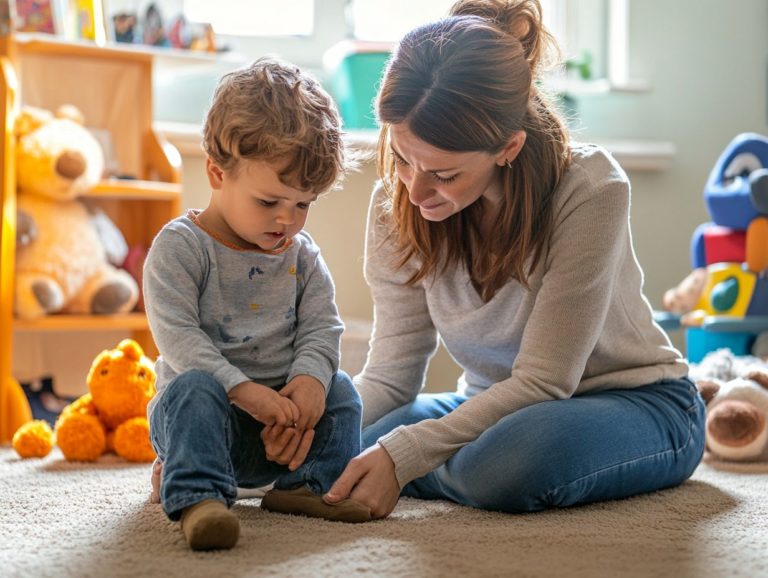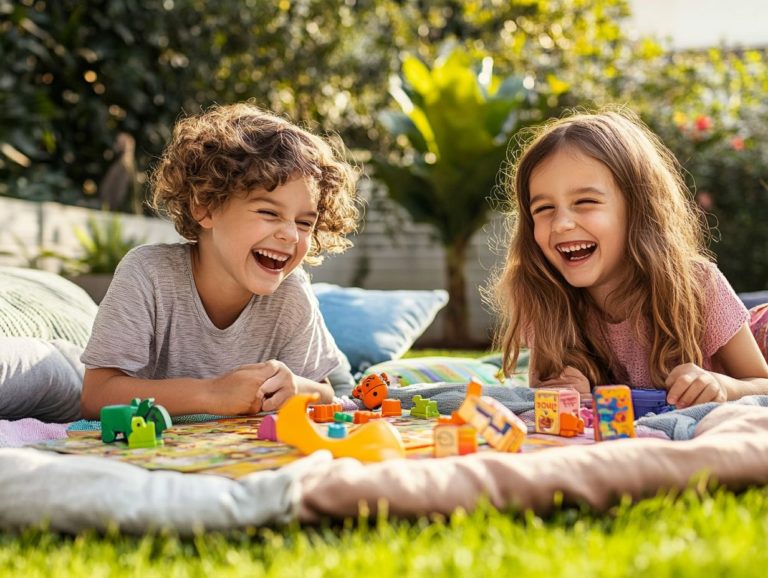What Resources Support Mindful Parenting?
In today’s fast-paced world, you might often find parenting to be overwhelming and chaotic. Mindful parenting presents a refreshing approach that enables you to cultivate a deeper connection with your children while simultaneously reducing stress and anxiety.
This exploration delves into the significance of mindful parenting, highlighting its numerous benefits such as improved emotional regulation, enhanced communication skills, and better understanding of your children’s needs. You’ll discover practical strategies to weave mindfulness into your everyday family life.
Uncover valuable resources that can support you on this journey, transforming parenting into a more fulfilling experience for both you and your child. Resources include books by clinical experts like Dr. Mark Bertin and Elisha Goldstein, online courses, and support groups.
Contents
Key Takeaways:

- Mindful parenting promotes a positive parent-child relationship and helps reduce stress and anxiety.
- Practicing active listening, setting realistic expectations, and understanding your children’s emotions are key components of mindful parenting.
- Resources such as books, online courses, support groups, and mindfulness tools can support and enhance mindful parenting practices.
Why is Mindful Parenting Important?
Mindful parenting is a crucial practice that enables you to forge a deeper connection with your children, enhancing emotional awareness while alleviating parental anxiety. By embracing mindfulness, you can approach stressful situations with a composed and calm response, creating a nurturing environment that supports your child’s developmental milestones and skills for understanding feelings and relationships.
Experts like Dr. Mark Bertin, who authored “The Family ADHD Solution,” and Elisha Goldstein, known for “The Now Effect,” highlight the significance of giving your full attention and practicing self-compassion as you navigate the complexities of parenting. This approach not only helps you manage feelings of frustration and anger but also elevates the emotional well-being of both you and your child, resulting in more meaningful and enriching interactions.
What are the Benefits of Mindful Parenting?
Mindful parenting presents a wealth of benefits that can significantly enhance the dynamics between you and your children. It ultimately elevates the overall well-being of your family.
Research from ZERO TO THREE underscores how practicing mindfulness can lead to improved parent-child relationships, marked by deeper trust, connection, and understanding.
Research shows it substantially reduces stress and anxiety levels for parents, fostering healthier emotional regulation that benefits everyone involved.
By cultivating enhanced communication skills through mindful practices, you can express your needs and emotions more effectively. This creates a nurturing environment that promotes positive parenting and unwavering support within your family.
1. Improved Parent-Child Relationship
An improved parent-child relationship is one of the most significant outcomes of practicing mindful parenting, where your active listening and emotional presence play crucial roles in fostering deeper connections.
These techniques enable you to genuinely engage with your children, creating an atmosphere of trust and understanding. For example, when your child feels heard during a moment of frustration, they are far more likely to open up about their feelings. This leads to constructive conversations instead of arguments.
Imagine a mother who noticed a remarkable shift in her relationship with her teenage daughter after practicing active listening. Instead of dismissive responses, they started to share heartfelt discussions, resulting in a stronger bond. Similarly, fathers who embrace emotional attentiveness often find their family unit becomes more cohesive. Isn’t it incredible how simple techniques can transform family dynamics?
Start weaving mindful practices into your daily routine and watch your family flourish together!
2. Reduced Stress and Anxiety
Imagine a home filled with calm and understanding! The practice of mindfulness can significantly reduce stress and anxiety levels for you as a parent. This enables you to tackle the daily challenges of parenting with greater ease and resilience. Techniques such as deep breathing and acceptance can aid in this process.
By embracing deep breathing and self-compassion, you can cultivate a more mindful approach in your interactions with your children. Taking a few moments to pause and reflect can greatly enhance your emotional regulation. This allows you to respond thoughtfully rather than react impulsively in stressful situations. Incorporating breathing exercises can be particularly effective in maintaining a serene state of mind.
Acknowledging your feelings without judgment fosters a supportive inner dialogue. This is essential for navigating the ups and downs of parenting. Integrating these mindfulness practices into your daily routine whether through brief meditations during quiet moments or establishing family rituals that promote connection can enable you to maintain a serene state of mind. Ultimately, this creates a calmer atmosphere in your household.
3. Better Emotional Regulation
Better emotional regulation is a hallmark of mindful parenting. It allows you to respond to frustration and anger with thoughtfulness rather than impulsive reactions.
This approach benefits you and creates a nurturing environment for your children. It equips them with essential coping skills. Cultivating emotional awareness helps you identify your triggers. Taking a moment to pause before responding is key to emotional regulation. Techniques like practicing acceptance enable you to acknowledge your feelings without judgment, allowing for more constructive responses.
To enhance this practice, consider engaging in daily mindfulness exercises, such as deep breathing or guided meditations. Regular check-ins with yourself throughout the day can help you assess your emotional state. This ensures that you remain grounded and responsive instead of reactive when tensions rise. Practicing acceptance is also key for maintaining emotional regulation.
4. Enhanced Communication Skills

Enhanced communication skills are a significant benefit of mindful parenting. This practice helps you understand your children’s needs and express yourself clearly, fostering a more harmonious family dynamic.
By embracing techniques such as active listening, you create an environment where your children feel valued and heard. This approach helps you address misunderstandings before they escalate and strengthens the emotional connection within your family. When you engage with your children through thoughtful dialogue, you foster a sense of security that encourages them to share their thoughts and feelings without fear of judgment.
Over time, this improved communication becomes essential for resolving conflicts and nurturing deeper family bonds. Ultimately, this leads to a more harmonious home environment.
How to Practice Mindful Parenting?
Practicing mindful parenting encompasses various techniques and strategies designed to foster presence and connection with your children. This ultimately enriches your parenting experience. By understanding your children’s emotions and needs, you can create a stronger emotional bond.
By anchoring yourself in the moment, you cultivate a deeper understanding of your children’s emotions and needs. This is essential for enhancing both their emotional well-being and your relationship with them.
Embracing techniques like active listening, understanding and caring for others feelings, and setting realistic expectations are vital elements of this approach. These practices enable you to navigate the complexities of parenting with grace and intention. They transform challenges into opportunities for growth and connection. Understanding your children’s developmental milestones can also aid in this process.
Don’t wait to transform your parenting journey! Start practicing these techniques today.
1. Embrace the Present Moment with Your Children
Being present in the moment is a cornerstone of mindful parenting. It underscores the significance of offering your children your undivided attention during every interaction. Full attention ensures your children feel heard and valued.
This intentional approach not only deepens emotional connections but also nurtures a profound sense of security and belonging within your child. When you consciously engage in these moments, it communicates to your children that they are valued and truly heard. This, in turn, cultivates their emotional intelligence and boosts their confidence.
To minimize distractions, establish a technology-free zone during family time. Active listening enhances your awareness and allows for thoughtful responses to your children s needs.
Incorporating simple rituals like shared meals or bedtime stories helps reinforce this vital connection, transforming each encounter into a treasured opportunity for meaningful dialogue.
2. Practice Active Listening
Active listening is a crucial skill in mindful parenting. It helps you truly understand your children’s needs and feelings.
Unlike just hearing, which is merely about sounds entering your ears, active listening demands your genuine engagement and focus. This practice means hearing what your child says and understanding the feelings behind those words.
You can elevate your active listening skills by incorporating techniques such as:
- Maintaining eye contact
- Nodding to show understanding
- Summarizing what your children say
- Asking open-ended questions that encourage deeper dialogue
By integrating these practices into your daily routine, you can significantly improve your family’s emotional state and create a more compassionate home environment.
By embracing these methods, you foster a stronger emotional connection, allowing your children to feel valued, respected, and better understood. This leads to a more harmonious family dynamic.
3. Cultivate Empathy and Understanding
Cultivating empathy and understanding is essential for your journey in mindful parenting. It enables you to connect with your children on a deeper emotional level, fostering a nurturing environment where they feel valued and understood. This emotional connection plays a crucial role in their overall development. Taking deep breaths and staying calm helps in better connecting with their emotions.
When you practice empathy, you not only respond to your child s needs more effectively, but you also model compassionate behavior, which creates a supportive atmosphere at home. Employing simple strategies like active listening, validating their feelings, and engaging in playful interactions can significantly enhance these connections.
By stepping into your child s shoes, you can alleviate stress and create a more harmonious home, leading to a peaceful coexistence that nurtures respect and understanding.
4. Set Realistic Expectations
Setting realistic expectations is a cornerstone of mindful parenting, enabling you to maintain a balanced emotional state while effectively supporting your child’s growth. It s essential to understand your child s unique needs, like learning disabilities (challenges with reading or math), ADHD (a condition affecting attention), and autism (a developmental disorder), to support their growth effectively.
When you cling to unrealistic expectations, it often leads to frustration and stress. This not only hampers your ability to nurture effectively but can also negatively affect your child’s emotional well-being. Such a disconnect might arise from societal pressures or personal aspirations that fail to acknowledge the uniqueness of each child.
To cultivate a more harmonious environment, it’s crucial to establish achievable goals tailored to your child’s individual abilities and temperament. By prioritizing open communication, celebrating small victories, and embracing the understanding that parenting is a journey not a race you and your child can truly flourish together, building a positive and loving relationship.
What Resources Support Mindful Parenting?

A wealth of resources awaits you on your journey toward mindful parenting, enabling you to cultivate the essential skills and knowledge needed for effective parenting. From insightful books and articles to dynamic online courses and workshops, these tools offer invaluable perspectives on the principles of mindfulness in parenting.
Support groups and communities offer chances for connection and shared experiences among parents, enriching your journey. Mindfulness apps and tools can assist you in establishing daily practices that nurture your well-being.
For those in pursuit of more personalized guidance, professional therapy and counseling can elevate your parenting approach to new heights.
1. Books and Articles
Books and articles on mindful parenting are invaluable resources, offering you insights and techniques to enhance your parenting skills. Authors such as Dr. Mark Bertin, who wrote The Family ADHD Solution, and Elisha Goldstein, known for The Now Effect, provide strategies specifically geared toward parents managing various challenges like ADHD and autism.
These resources explore being present. They encourage you to cultivate awareness and compassion in interactions with your children. Don’t miss out on notable works like The Whole-Brain Child by Daniel J. Siegel and Tina Payne Bryson, which provide practical strategies that marry neuroscience with everyday parenting challenges. Similarly, Mindful Parenting by Kristen Race presents transformative practices designed to reduce stress and cultivate joy within family dynamics.
Other notable authors include Dr. Amy Saltzman, who wrote Still Quiet Place, and experts from ZERO TO THREE, a renowned organization in early childhood development.
By diving into these essential texts, you can implement mindful techniques that foster deeper connections, promote emotional intelligence, and ultimately create a more harmonious family environment.
2. Online Courses and Workshops
Online courses and workshops provide you with organized ways to learn and deepen your understanding of mindful parenting principles. These courses often involve insights from experts like Dr. Amy Saltzman and her Still Quiet Place program, which focuses on mindfulness for children and parents.
These educational resources come in various formats, including:
- Webinars
- Interactive sessions
- Downloadable materials
Each format ensures there’s something to suit your unique learning style. For example, workshops often delve into crucial topics such as emotional regulation, effective communication, and stress reduction techniques each vital for cultivating a nurturing environment. Notable online platforms, such as those offered by the Mindful Schools community and Cynthia Braun, provide specialized courses to enhance these skills.
Many of these programs prioritize practical exercises and community discussions, giving you the chance to connect with fellow parents navigating similar challenges. By engaging in these courses, you ll cultivate greater awareness and presence in your interactions with your children, ultimately fostering a more harmonious family dynamic.
Start exploring these resources today!
3. Support Groups and Communities
Support groups and communities are critical in your journey of mindful parenting. They create a sanctuary where you can share experiences, gain valuable insights, and forge connections with others on a similar path. Engaging in a parent survey can also provide you with data-driven insights to better understand the common challenges and successes within your community.
These relationships not only provide essential emotional support but also cultivate a profound sense of belonging as you navigate the complexities of raising children. Explore local parenting meetups and online forums like Facebook groups or utilize platforms such as Meetup.com to facilitate the exchange of ideas and strategies that can enhance your parenting experience.
Communities in New York and Pleasantville are noted for their active participation and supportive networks for mindful parenting. Specialized networks, such as the Mindful Schools community, offer unique programs aimed at nurturing present-moment awareness for both you and your children.
Dive into these vibrant communities today to transform your parenting experience! By immersing yourself in these groups, you can tap into a wealth of resources and diverse perspectives that will enrich your mindful parenting journey, ultimately fostering more harmonious family dynamics.
4. Mindfulness Apps and Tools
Mindfulness apps and tools can greatly elevate your practice of mindful parenting. They provide accessible techniques and gentle reminders to weave mindfulness into your daily routines. These tools are invaluable in addressing the unique needs of both parents and children, ensuring a comprehensive approach to mindful living.
Designed specifically to address the challenges you face as a parent, these resources allow you to cultivate presence, patience, and awareness in your interactions with your children. For instance, apps like Headspace and Calm feature dedicated sections for parents, offering guided meditations focused on stress reduction and emotional regulation.
Tools like Insight Timer and Simple Habit deliver quick mindfulness exercises that seamlessly fit into your busy schedule. This helps you stay grounded amidst the delightful chaos of family life. By embracing these resources, you can enhance your own well-being while modeling healthy coping strategies and emotional intelligence for your children.
5. Professional Therapy and Counseling
Professional therapy and counseling can provide you with invaluable support as you seek to enhance your mindful parenting techniques through personalized guidance. Renowned experts like Dr. Mark Bertin offer specialized therapy for managing conditions such as ADHD and learning disabilities, which can significantly impact parenting dynamics.
By collaborating with qualified professionals, you can delve into your unique challenges. Whether it s managing stress, improving communication, or understanding your child s emotional needs, these experts offer tailored strategies and insights that foster a deeper connection with your children.
Therapy can help you identify patterns from your own upbringing that may be shaping your current parenting style. This fosters awareness and promotes healthier family dynamics. Notable professionals like Dr. Mark Bertin and Dr. Amy Saltzman provide key insights into managing these complex dynamics.
Ultimately, this collaborative approach not only enriches your personal journey as a parent but also cultivates a more harmonious environment for your entire family, allowing everyone to thrive together.

Frequently Asked Questions

What resources can support mindful parenting?
Many resources are available that can support mindful parenting, including books, online courses, support groups, and apps.
How can books help with mindful parenting?
Books can provide valuable information and techniques for practicing mindfulness as a parent. They can also offer different perspectives and insights on parenting from authors who have experience in this area.
Are there online courses for mindful parenting?
Yes! Online courses are specifically designed to help parents incorporate mindfulness into their parenting practices. These courses often include guided meditations and exercises to help parents cultivate awareness and compassion.
Benefits and Techniques of Mindful Parenting
What are the benefits of joining a support group for mindful parenting?
Joining a support group provides a sense of community and understanding among parents practicing mindfulness. It creates an exciting and safe haven for sharing experiences, challenges, and successes!
How can apps support mindful parenting?
Many mindfulness apps offer guided meditations, breathing exercises, and journal prompts tailored for parents. These tools can help you easily incorporate mindfulness into your daily routine.
Is it possible to practice mindful parenting without any external resources?
Yes, you can practice mindful parenting on your own. Mindfulness is about being present and aware, which you can develop through personal practice and self-reflection. External resources, however, provide valuable support and guidance, especially for beginners.






